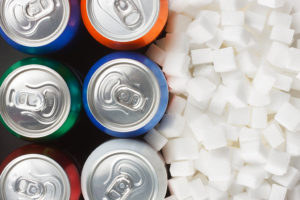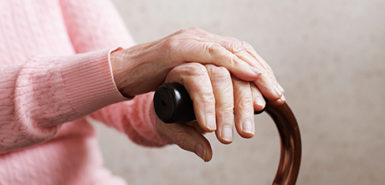
You know that soda and apple juice in your refrigerator? It could be shrinking your brain.
A recent study published in Alzheimer’s & Dementia found that, on average, the more sugary drinks a person consumes, the lower their total brain volume—and the worse they score on memory tests.
Brain shrinkage is linked to dementia and Alzheimer’s disease, the authors noted.
Brains naturally shrink as humans get older, said Maegen Hatfield-Eldred, PhD, a neuropsychologist with Spectrum Health Medical Group. But those who consumed one or two sugary drinks per day, according to the new study, showed an extra 1.6 years of brain shrinkage and lower memory scores equivalent to 5.6 years of aging.
For those who had more than two drinks per day, their brains had shrunk the equivalent of two extra years, with lower memory scores equivalent to 11 years of aging.
Authors controlled for a variety of health and behavioral factors, including smoking, physical activity, total caloric intake, diabetes, varying head sizes and many other factors. Participants under 30 years old and those who had already demonstrated dementia were excluded from the study.
Although diet is important regarding brain health, Dr. Hatfield-Eldred said, she cautioned against overreacting to the study.
The study didn’t look at individual brains over a long period of time to see how they’re affected by regular sugar intake. Instead, it took a snapshot of brains at one point in time and compared them to averages within the group of study participants, she said.
“A longitudinal study would tell us the most about how sugar affects the brain over time,” said Dr. Hatfield-Eldred, who was not involved in the research.
What are sugary drinks?
So excessive sugary drinks may be bad for your brain. But what qualifies as a sugary drink?
Sugary drinks are any drinks with added sugar in them, said Kristi Veltkamp, a registered dietician with Spectrum Health Medical Group.
“Pop is the biggest one. Soda,” Veltkamp said. “But anything that has added sugar: Sweet tea, lemonade, Kool-aid, and even fruit juice. A lot of times people are drinking juice and thinking they’re doing good, but really they’re just putting sugar in their body.
“One 16-ounce cup of fruit juice is like eating four pieces of whole fruit. Even if it says ‘100 percent juice’ on the label and there is no added sugar, it’s still sugar. It sounds confusing to people, but it’s still a sugary drink.”
Some other major culprits: sports drinks such as Gatorade and Powerade, and energy drinks such as 5-Hour Energy, Red Bull and Monster Energy.
A previous 2017 study from the University of Bath and the Wolfson Centre for Age Related Diseases at King’s College London had demonstrated how high blood-sugar levels led to the destruction of a key enzyme that protects the brain from buildup of certain proteins in the brain often found in Alzheimer’s patients.
I think we need to keep in mind that diet is important in brain health, not just when we get older, but throughout life. … It’s just one piece of the puzzle in reducing risk, not everything.
But this new study was the first to try to demonstrate how high sugar intake might directly affect the brain.
“Excess sugar is well known to be bad for us when it comes to diabetes and obesity, but this potential link with Alzheimer’s disease is yet another reason that we should be controlling our sugar intake in our diets,” Dr. Omar Kassaar, of the University of Bath, said in February after the first study was published.
Healthier options
If a patient would like to cut back on his or her sugar intake, start with “baby steps,” said Jessica Corwin, a registered dietician with Spectrum Health Healthier Communities.
“I had a client who said she bought a 32-ounce Coke every day, and she just kept it with her and drank it throughout the day so she would have something to drink,” Corwin said. “In cases like her, we discussed a baby step could be transitioning to a 20-ounce Coke, along with a sparkling water or diet coke. I’m not a usually fan of artificial sweeteners, but at least it’s a step away from the nearly 100 grams of sugar found in her Coke.”
The pace of progress wasn’t as important as making progress, Corwin said.
“If you drink a lot of fruit juice, try diluting your glass by drinking half-and-half, with half water and half apple juice. Or half apple juice and half sparkling water,” she said. “Transform it into a non-alcoholic special drink. … There are lots of sparkling waters that don’t have any added sugars—LaCroix, Dasani and Hint are a few options. … Some of the options are even palatable to the little ones.”
Corwin said her three children enjoy these “special” drinks, referring to them as soda and laughing at the sometimes relatively sour flavors.
Other options are unsweetened teas, water infused at home with fruit or mint, and coffee with little or no added sugar, health experts said.
Because it was not a longitudinal study, the study didn’t examine how the brain and memory scores would be affected if one changed to a healthier diet. It also didn’t answer the question of “How much is too much?” Dr. Hatfield-Eldred said.
“This study doesn’t tell us that any extra sugar is automatically bad,” she said. “I wouldn’t want people to walk away thinking, ‘I can never have apple juice.’”
And although proper diet is important, there are many other steps people should be taking to reduce risk factors and keep their minds sharp, Dr. Hatfield-Eldred said.
“I think we need to keep in mind that diet is important in brain health, not just when we get older, but throughout life,” she said. “But it’s just one piece of puzzle in reducing risk, not everything.
“Studies consistently show that exercise is really important in reducing risk,” she said. “Keeping your brain active is really important—doing things that you make think.
“Education is also really important,” she said. “The number of years of higher education has been shown to be a factor in the risk of dementia down the road. But also constant, lifelong learning: Engaging in senior programs, learning new hobbies, keeping your mind active—even outside of traditional classroom setting—is important to reducing risk.”
 /a>
/a>
 /a>
/a>
 /a>
/a>